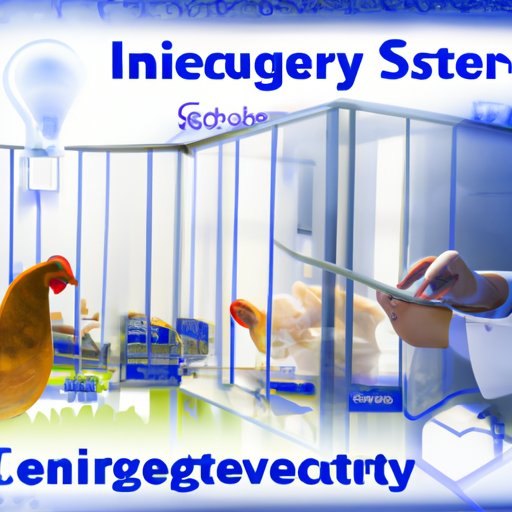Introduction
Poultry science is an interdisciplinary field of study that focuses on the production of poultry products, such as eggs and meat. It combines elements of biology, chemistry, nutrition, economics, management, and other areas of science to understand and improve the production of poultry products. The purpose of this article is to provide an overview of the field of poultry science and its importance.
Exploring the Field of Poultry Science: An Overview
What is poultry science? According to the American Society of Animal Science, “Poultry science is the application of scientific principles to the production of poultry for food, recreation, or other uses.” It involves the study of the physiology, nutrition, reproduction, genetics, behavior, housing, and management of poultry. Poultry science differs from other branches of science in that it focuses specifically on poultry production.
The importance of poultry science cannot be overstated. Poultry products are a major source of food and nutrition around the world. As the global population continues to grow, so does the demand for poultry products. Poultry science helps to ensure that these products are produced in a safe and efficient manner. It also helps to protect the environment by reducing the amount of resources used in poultry production.

How Poultry Science is Used to Improve Food Safety and Animal Welfare
Poultry science plays an important role in improving food safety and animal welfare. Understanding food safety issues related to poultry is essential for producing safe and nutritious poultry products. Research in the field helps to identify potential risks and develop strategies for minimizing them. For example, research has shown that certain bacteria, such as Salmonella, can be present in poultry products and cause foodborne illness if not properly handled. By studying these risks, scientists are able to develop methods for reducing the risk of contamination and ensure that poultry products are safe for consumption.
Improving animal welfare is also an important part of poultry science. Research in the field helps to identify potential welfare issues and develop strategies for addressing them. For example, studies have demonstrated the importance of providing birds with adequate space, access to natural light, and enrichment activities. By understanding the needs of birds, scientists are able to develop methods for improving their welfare and ensuring that they are treated humanely.

The Role of Genetics in Poultry Science
The use of genetics in poultry science is essential for producing healthy, high-quality birds. Through selective breeding, scientists are able to produce birds with desirable traits, such as disease resistance, improved feed conversion efficiency, or enhanced meat quality. Genetic diversity is also important for maintaining the health of the flock. By introducing new genetic material into the flock, scientists can help to reduce the risk of inbreeding and ensure that birds remain healthy and productive.

The Latest Innovations and Technologies in Poultry Science
In recent years, there have been numerous advances in the field of poultry science. Breeding and selection techniques have become more precise, allowing scientists to more accurately select birds with desired traits. New technologies, such as robotics and artificial intelligence, are being developed to improve efficiency in poultry production. These technologies can help to reduce labor costs, improve feed conversion efficiency, and increase overall production yields.
A Career in Poultry Science: Opportunities and Challenges
A career in poultry science offers many opportunities for those interested in the field. Those who pursue a career in poultry science must have a strong background in science, particularly in biology and genetics. Education and training are essential for success in the field, and many universities offer degree programs in poultry science. Job opportunities in the field include positions in research, production, education, and management.
Despite the many opportunities in the field, there are also challenges faced by those working in poultry science. Poultry production is a highly competitive industry, and those working in the field must stay up-to-date on the latest developments and technologies. Additionally, the job can be physically demanding and may involve long hours or overnight shifts.
Conclusion
Poultry science is an interdisciplinary field of study that focuses on the production of poultry products. It combines elements of biology, chemistry, nutrition, economics, management, and other areas of science to understand and improve poultry production. Poultry science is used to improve food safety and animal welfare, as well as to understand the role of genetics in poultry production. The field is also making use of the latest innovations and technologies to improve efficiency and production yields. A career in poultry science provides many opportunities for those interested in the field, though it also presents some challenges.
(Note: Is this article not meeting your expectations? Do you have knowledge or insights to share? Unlock new opportunities and expand your reach by joining our authors team. Click Registration to join us and share your expertise with our readers.)
